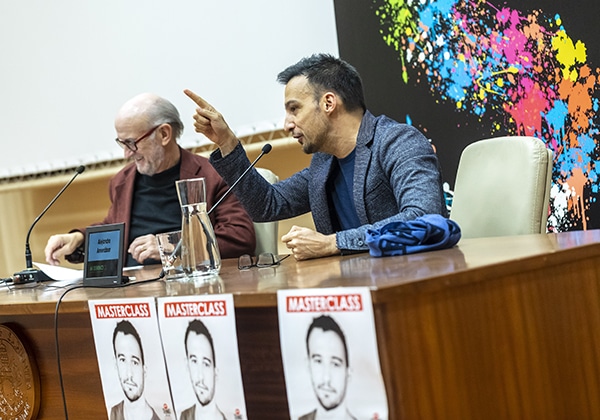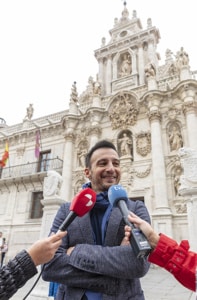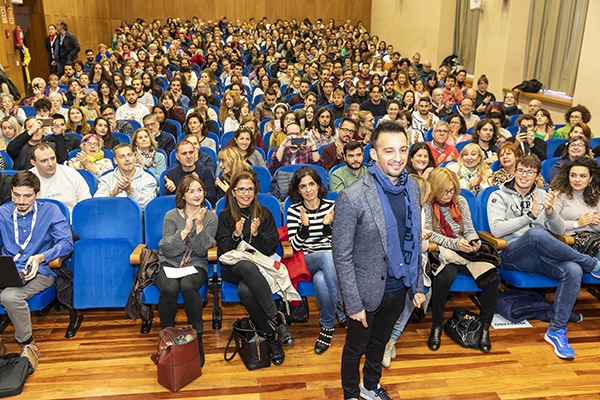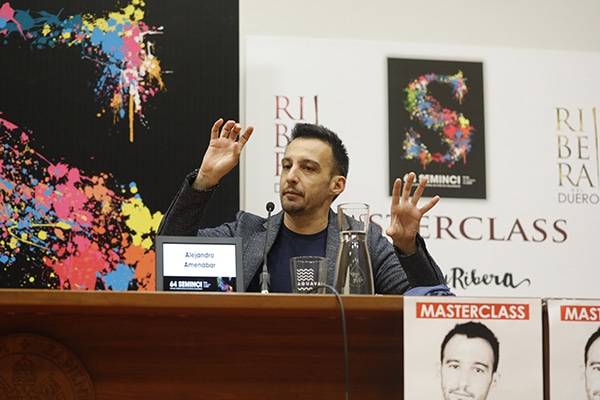
Javier Angulo, director of the Seminci, with Alejandro Amenábar
22/10/2019.- Director Alejandro Amenábar offered a master class in the Mergelina Classroom at the University of Valladolid this Tuesday, October 22, as part of the Valladolid International Film Festival. The filmmaker, who will be awarded the Spike of Honour for his career on the Spanish Cinema Day at the 64th Seminci, gave a master class during which he reviewed his career as a director, screenwriter, and film composer.
The author of the newly-released Mientras dure la guerra (While the War Lasts) won an Oscar Award for Best Foreign Language Film in the 2004 edition for his film The Sea Inside. Amenábar, who directed the acclaimed Tesis, Agora, Open your Eyes, and Regression, says: «I’m happiest when I’m shooting» because he considers filming his «natural state».
The master class, which was an overwhelming, full-house success, reviewed Amenábar’s work. The filmmaker had been dreaming of «making the films and stories I told my friends come true» since he was a child. He achieved his goal when, aged 20, he released his first short film, La cabeza, followed by two other short films — La extraña obsesión del Doctor Morbius and Himenóptero. According to Amenábar, short films taught him «what I needed to know» in order to face his first feature film, Tesis.
In 1996, when he was only 24, he premiered his directorial debut, which established him as a director and made him win his first Goya Award for Best Film. Amenábar «affectionately»remembers arriving in Berlin and seeing the poster for his film for the first time.

Some of the topics addressed during the master class were the creative process, script writing, settings, or sequence arrangement. He remembers being «passionate about sequences, about camera angle, playing…» at the beginning of his career. When he embarked on his first feature film, he «already knew how I wanted to do things», and his main concern was «getting to do what I wanted within a mere five weeks of filming»-
Amenábar says he fell in love with cinema when he discovered the inner creative processes of the Hitchcock, Kubrick, and Spielberg trio, the latter being his favourite filmmaker. However, it was director José Luis Cuerda, his mentor, that gave him the opportunity to carry out his own work. He called Amenábar personally, invited him over to one of his shootings, and encouraged him to write Tesis: «He said, ‘You are a good filmmaker, now you have to figure out how to be a good person». According to Amenábar, Cuerda «was very Ciceronian».
Amenábar had the chance to ‘experience Hollywood’ when filming The Others, but he says he prefers to work in Spain. An example of this is his latest film, Mientras dure la guerra, a drama about the Spanish Civil War starring Karra Elejalde, who plays the role of Miguel de Unamuno. The actor, who will also take part in the Spanish Cinema Gala tonight, says proudly that «although there may be five Unamunos in the world, there is only one Karra Elejalde». Amenábar says he loves historical films and, although he refuses to consider himself a “cinema activist” he says that his films “do stem from a moral concern.”
Amenábar isn’t afraid of cinema’s immediate future, a subject raised by many of the final questions, «as long as I can keep having the creative freedom I’ve had so far». Amenábar, who wants to adapt to the reality of multiplatform production, does not approve of a film designed for a large cinema screen ending up being viewed on a mobile phone, and sometimes at «higher speeds so as to consume more». This is why the filmmaker says that Movistar, which produced his latest feature film Mientras dure la guerra, «understood that we wanted to make a theatre film and not a multiplatform film».
Alejandro Amenábar claims to be a «born optimist», and although he is shooting his first Netflix miniseries at the moment, he keeps striving to tell a story in two hours: «I find it frustrating having to watch a six-season television series in order to be told a story». The acclaimed filmmaker spoke frankly about his philosophy: «I have a story. Give me two hours and I’ll tell you that story».

Alejandro Amenábar in the Mergelina Classroom of the University of Valladolid



























![Logo Foro Cultural de Austria Madrid[1]](https://www.seminci.com/wp-content/uploads/2024/09/Logo-Foro-Cultural-de-Austria-Madrid1-300x76.jpg)








